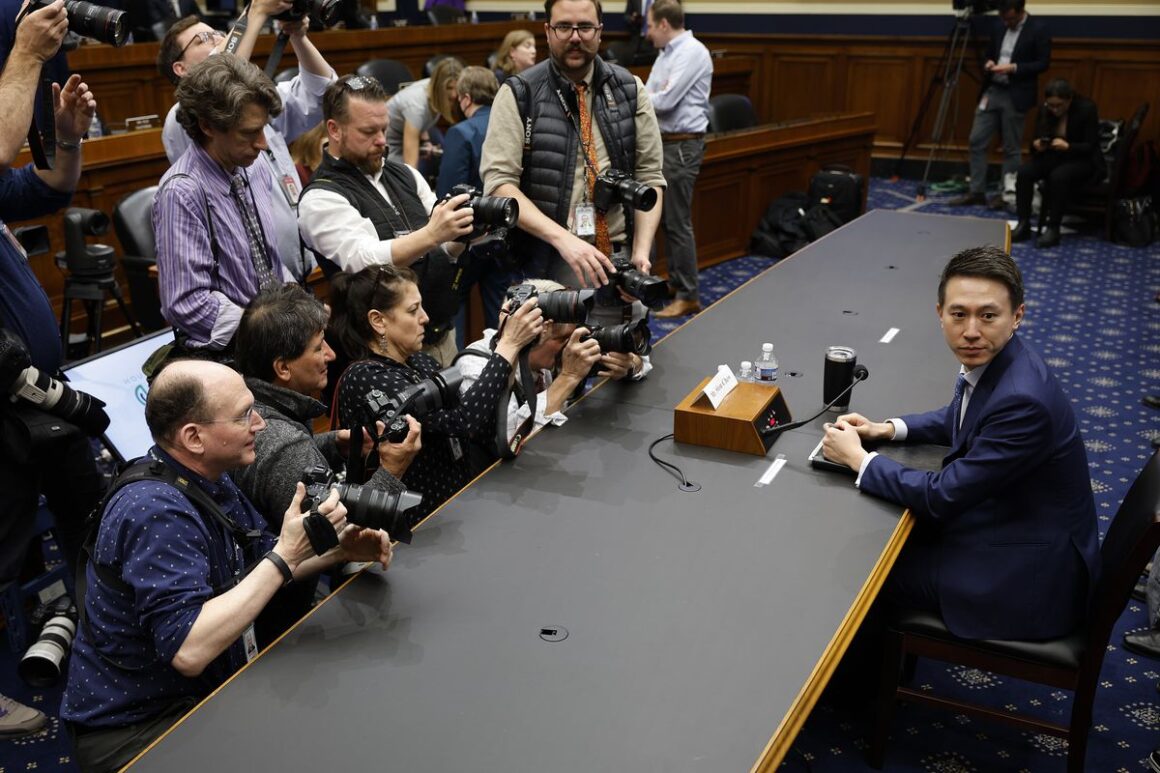By Anne Liu
TikTok CEO Shou Zi Chew came out on top after a March 23 Congressional hearing in which U.S. lawmakers demonstrated their zeal to “win” the U.S.-China Cold War and their embarrassing incompetence at handling tech-related matters altogether.
This was by far the most public trial of the Chinese-based social media app to date, which had previously come under threat of a ban by the Trump administration in 2020. Now, both wings of the corporate establishment are bringing forward a legislative proposal to ban TikTok and other “foreign” technologies under the pretense of user privacy and national security.
Why is TikTok the target?
The U.S. ruling class has been building a case against the Chinese-based app for a couple of years. Trump’s original ban was shot down by federal courts, which cited a lack of a “sufficient process” to do so. In an effort to circumvent an immediate judicial defeat, Biden withdrew the order in 2021 and replaced it with an order for the Committee on Foreign Investment in the United States (CFIUS) to review the app. The CFIUS reviews financial transactions and business combinations that could be a “threat” to national security, and in recent years, it has received an expanded purview under Biden’s commitment to economically compete with China.
American legislators are now trying to go further with what has been dubbed the “Patriot Act 2.0.” Republicans have submitted a slew of proposals targeting TikTok specifically, but it’s the bipartisan, White House-backed RESTRICT Act that has the likeliest chance of passing. At its core, the RESTRICT Act is a united bid by American politicians and business interests to consolidate executive state power over social media platforms based on a pursuit of imperialist interests and at the expense of our civil rights.
RESTRICT’s language is engineered to hand the government extreme oversight over our digital lives and leave individual users in the crosshairs. Section 11, for instance, makes the use of VPNs (a common tool used by individuals for online privacy) to access banned software such as TikTok a criminal act punishable by a minimum fine of $250,000 or $1,000,000 if they knowingly did so. To enforce penalties like this, RESTRICT gives unchecked power to federal entities like the CFIUS and the Secretary of Commerce to spy on and censor ordinary people using our private routers, modems, VPNs, phone cameras, apps — anything that uses the Internet.
As Edward Snowden revealed in 2013 and as we’re seeing today, capitalist regimes the world over will disregard basic human rights at will if it benefits their system. And like the U.S., the Chinese state is no exception, in many ways setting an example for other ruling classes in terms of mass censorship and the policing of free speech. The CCP employs a sizable workforce to monitor social media, and its proxies wage online campaigns against feminism and those who are deemed insufficiently nationalist. Not only are people’s accounts shut down, but they can face real consequences like jail time and intense harassment, even for dissident Chinese nationals abroad.
The hearing
There’s no doubt that the U.S. government is hypocritical in targeting a Chinese-based app while looking to ratchet up mass digital surveillance to unprecedented heights. Unlike TikTok so far, there’s concrete evidence that Facebook and Apple – both American companies – knowingly shared user data with the CCP in 2018 in order to secure market shares in China. None of this was brought up in the March 23 Congressional hearing, after which many people rightfully pointed out the xenophobia and racism during TikTok CEO Shou Zi Chew’s questioning. Right-wing Texas representative Dan Crenshaw, for instance, carried on with a condescending, long-winded rant about Chinese tech law before being reminded that Chew is Singaporean. Considering the bigotry (and general cluelessness) on full display, Chew emerged from his hearing looking like the trustworthy party in this whole debacle, especially since Sinophobia and imperialist tensions with China have gone hand-in-hand during the current period.
But let’s be clear: Chew is no hero. In fact, he’s one of countless tech CEOs who profit off of exploiting their employees and our personal data. On top of industry-standard intrusions like knowing your location data, IP address, keystroke patterns, battery life, etc., TikTok collects millions of people’s biometric data in the form of faceprints and voiceprints. Just last year, TikTok’s parent company ByteDance was caught spying on journalists in an effort to identify employees who had been leaking information to the press. Of course, there’s no question that other American companies have committed equally egregious violations of privacy, as shown by the Facebook-Cambridge Analytica scandal in 2018.
The war against TikTok in particular is part of a broader, bipartisan program of competition between the ruling classes of the U.S. and China on the world stage, a struggle between the world’s two most powerful imperialist states for dominance. So far, the American campaign to cut across the rise of Chinese power includes the banning of sharing high end chip technology, military buildup, relentless propaganda about the alleged fight between “autocracy and democracy”, and even legislation in some states to ban Chinese nationals buying land in the U.S., especially near American military bases. This geopolitical push against China comes from both Democrats and Republicans, even if Biden avoids the “China flu” kind of rhetoric that has contributed directly to the wave of deadly anti-Asian attacks around the country.
In the end, ByteDance may very well be forced to sell its American holdings. That doesn’t necessarily mean that TikTok will be shut down, but if it does, we can assume another tech company can and will replace it with a very similar service.
Can we keep scrolling?
TikTok undeniably holds real value for its 1.05 billion active monthly users. Artists, small business owners, grassroots movements, and regular people enjoy its digital infrastructure for little to no cost—making the app something of a public service to many. TikTok’s actual worth to the masses rarely comes up in geopolitical discussions about its future, however, because its popularity in America represents a grating contradiction in the escalating U.S.-China imperialist Cold War.
The potential banning of TikTok is a serious issue of censorship in an era where social media is a huge part of our social lives. While social media has much positive potential, social media companies are owned and operated by private tech companies, which are incentivized to cultivate addictive behavior to maximize profit. This for-profit model of mass communication platforms has contributed to many serious problems, including the youth mental health crisis, the spread of conspiracy theories and misinformation, and the facilitation of the alt-right pipeline.
Socialists recognize that under the capitalist system where corporations practically own everyone’s digital lives and where state powers use us as bargaining chips, there will never be any true privacy, complete freedom of expression, or clarity of communication. Social media – along with Internet access in general – should be free public utilities democratically run by workers and users, not by shady corporations whose interests will never align with ours. In young and working people’s movements against capitalist exploitation and imperialist conflict, we need to fight to make digital liberation a reality as well.












